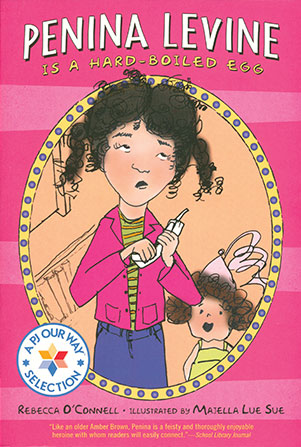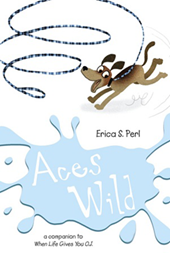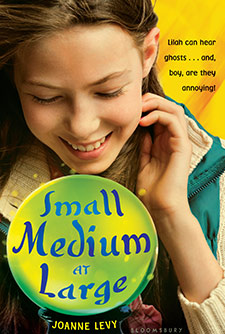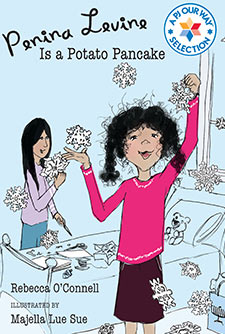Penina Levine is a Hard-Boiled Egg
Penina Levine’s in BIG trouble. She’s already been sent to the principal’s office and gotten detention. Maybe she’ll even flunk sixth grade. All because of one assignment. Which she is NOT going to hand in. EVER.
Average Rating
( hint: Login to leave a review! )
75 Reviews
Leave Review
What the Book is About
Jewish Content & Values
Positive Role Models
Content Advisory
Talk it Over!
More for You
What the Book is About
When sixth grader Penina Levine refuses to complete her school assignment to write a letter as the Easter Bunny, she finds herself in hot water. And to make matters worse, Penina’s little sister, Mimsy, is an expert at getting impulsive Penina into trouble at home. While Penina feels that her parents don’t ever understand, her Grandma always has a sympathetic ear. This is a fresh and readable story about contemporary Jewish identity.
Jewish Content & Values
- Penina’s family practices the traditions of Passover by cleaning their house of hametz, and celebrating their Seder with matzo, wine, the Four Questions, Elijah’s cup, and the Afikoman -- all of which are defined within the framework of the story.
- In a gesture of conciliation, Penina invites her sixth grade teacher to celebrate Shabbat with her family.
- Penina’s schoolmate, Ryan, invites his grandmother, a Holocaust Survivor from France, to share her story with the class.
Positive Role Models
- Mr. Tobin, Penina’s principal, is a real “mensch” and a wonderful educator. He never misses an opportunity for a learning experience. When Penina breaks the rules, he is calm, firm, and sympathetic, and explains why the laws of free speech do not protect her outburst, and when he learns of the Easter Bunny incident, he introduces a diversity curriculum to her class.
- Penina is a typical middle schooler: she’s occasionally self-absorbed, grouchy, and impulsive. However, she also demonstrates real maturity and forgiveness when she invites her teacher for Shabbat and graciously gives Mimsy credit for the idea. She also demonstrates real insight while grappling with the idea of writing a letter as the Easter bunny, ultimately staying true to her values.
Content Advisory
- Penina receives a detention at school for inappropriate speech usage, and although the actual word she uses is not written out in the book, it is described as “an eight letter word beginning with a B. It meant the waste product of a large horned animal...”
- There are a few "gross out" stories about dead squirrels and tapeworms.
- Zozo intends to bring Mimsy to church, with Penina’s consent. Many Jewish people maintain that it’s forbidden for a Jew to attend religious services at a church and some could be offended by the idea.
Talk it Over!
- When Penina says something really inappropriate to her teacher, she gets into trouble at school. Dr. Tobin explains that the First Amendment of the U.S. Constitution gives all of us the right to express ourselves with limitations.
- In your opinion, what sort of remarks should not be protected by the First Amendment? What kinds of words should be allowed?
More for You
In Jewish tradition, eggs symbolize loss and mourning by reminding us of the sacrifices offered long ago at the Holy Temple. The egg’s roundness also signifies the cycle of life and renewal. Hard-boiled eggs are served to mourners during their first post-funeral meal eaten together; eggs are also sprinkled with ashes for the meal before Tisha B’av, and they are dipped in salt water at the Passover Seder. While eggs are clearly an animal product, in kosher law, eggs are considered parve, neither meat nor dairy (except if found in a slaughtered hen, in which case they are considered to be meat).
What the Book is About
What the Book is About
When sixth grader Penina Levine refuses to complete her school assignment to write a letter as the Easter Bunny, she finds herself in hot water. And to make matters worse, Penina’s little sister, Mimsy, is an expert at getting impulsive Penina into trouble at home. While Penina feels that her parents don’t ever understand, her Grandma always has a sympathetic ear. This is a fresh and readable story about contemporary Jewish identity.
Jewish Content & Values
Jewish Content & Values
- Penina’s family practices the traditions of Passover by cleaning their house of hametz, and celebrating their Seder with matzo, wine, the Four Questions, Elijah’s cup, and the Afikoman -- all of which are defined within the framework of the story.
- In a gesture of conciliation, Penina invites her sixth grade teacher to celebrate Shabbat with her family.
- Penina’s schoolmate, Ryan, invites his grandmother, a Holocaust Survivor from France, to share her story with the class.
Positive Role Models
Positive Role Models
- Mr. Tobin, Penina’s principal, is a real “mensch” and a wonderful educator. He never misses an opportunity for a learning experience. When Penina breaks the rules, he is calm, firm, and sympathetic, and explains why the laws of free speech do not protect her outburst, and when he learns of the Easter Bunny incident, he introduces a diversity curriculum to her class.
- Penina is a typical middle schooler: she’s occasionally self-absorbed, grouchy, and impulsive. However, she also demonstrates real maturity and forgiveness when she invites her teacher for Shabbat and graciously gives Mimsy credit for the idea. She also demonstrates real insight while grappling with the idea of writing a letter as the Easter bunny, ultimately staying true to her values.
Content Advisory
Content Advisory
- Penina receives a detention at school for inappropriate speech usage, and although the actual word she uses is not written out in the book, it is described as “an eight letter word beginning with a B. It meant the waste product of a large horned animal...”
- There are a few "gross out" stories about dead squirrels and tapeworms.
- Zozo intends to bring Mimsy to church, with Penina’s consent. Many Jewish people maintain that it’s forbidden for a Jew to attend religious services at a church and some could be offended by the idea.
Talk it Over!
Talk it Over!
- When Penina says something really inappropriate to her teacher, she gets into trouble at school. Dr. Tobin explains that the First Amendment of the U.S. Constitution gives all of us the right to express ourselves with limitations.
- In your opinion, what sort of remarks should not be protected by the First Amendment? What kinds of words should be allowed?
More for You
More for You
In Jewish tradition, eggs symbolize loss and mourning by reminding us of the sacrifices offered long ago at the Holy Temple. The egg’s roundness also signifies the cycle of life and renewal. Hard-boiled eggs are served to mourners during their first post-funeral meal eaten together; eggs are also sprinkled with ashes for the meal before Tisha B’av, and they are dipped in salt water at the Passover Seder. While eggs are clearly an animal product, in kosher law, eggs are considered parve, neither meat nor dairy (except if found in a slaughtered hen, in which case they are considered to be meat).




